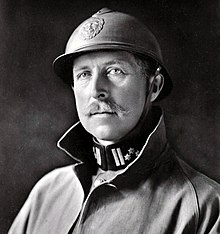

King of the Belgians
8 April 1875 Brussels, Belgium
17 February 1934(1934-02-17) (58) Marche-les-Dames, Namur, Belgium
NamesDutch: Albert Leopold Clemens Maria Meinrad French: Albert Léopold Clément Marie Meinrad German: Albert Leopold Clemens Maria Meinrad
Third King of the Belgians King of the Belgians Albert IAlbert I, pictured with his characteristic Adrian helmet, c.1919King of the BelgiansReign23 December 1909 – 17 February 1934PredecessorLeopold IISuccessorLeopold IIIPrime Ministers See list Frans Schollaert Charles de Broqueville Gérard Cooreman Léon Delacroix Henri Carton de Wiart Georges Theunis Aloys Van de Vyvere Prosper Poullet Henri Jaspar Jules Renkin Charles de Broqueville (2nd time) Born(1875-04-08 ) 8 April 1875 Brussels, BelgiumDied17 February 1934(1934-02-17) (aged 58) Marche-les-Dames, Namur, BelgiumBurialChurch of Our Lady of LaekenSpouseDuchess Elisabeth in Bavaria (m. 1900 )IssueLeopold III of Belgium Prince Charles, Count of Flanders Marie-José, Queen of ItalyHouseSaxe-Coburg and Gotha (until 1920) Belgium (from 1920)FatherPrince Philippe, Count of FlandersMotherPrincess Marie of Hohenzollern-SigmaringenReligionRoman Catholicism Albert I (8 April 1875 – 17 February 1934) reigned as King of the Belgians from 1909 to 1934. He ruled during an eventful period in the history of Belgium, which included the period of World War I (1914–1918), when 90 percent of Belgium was overrun, occupied, and ruled by the German Empire. Other crucial issues included the adoption of the Treaty of Versailles in June 1919, the ruling of the Belgian Congo as an overseas possession of the Kingdom of Belgium along with the League of Nations mandate of Ruanda-Urundi, the reconstruction of Belgium following the war, and the first five years of the Great Depression (1929–1934). King Albert died in a mountaineering accident in eastern Belgium in 1934, at the age of 58, and he was succeeded by his son Leopold III (r. 1934–1951 ). He is popularly referred to as the "Knight King" (roi-chevalier or koning-ridder) or "Soldier King" (roi-soldat or koning-soldaat) in Belgium in reference to his role during World War I.

We use cookies
We use cookies and other tracking technologies to improve your browsing experience on our website, to show you personalized content and targeted ads, to analyze our website traffic, and to understand where our visitors are coming from. Privacy Policy.